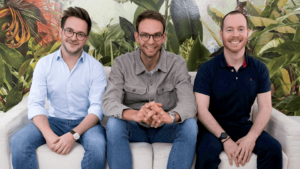Todor Gigilev: For A Social Innovation Project To Achieve Real Goals, It Needs To Be Generating Revenue And Paying The People Who Work For It
Crisis situations, like the current one related to the coronavirus, call for new approaches and quick actions. Hack the Crisis @ Bulgaria, an online hackathon that happened in March is an example of just that. In less than a week the entrepreneurial network Power of BG initiated and organized a hackathon and called the society to participate in the development of solutions for saving lives, communities, and businesses. And this initiative turned into the biggest ever hackathon in Bulgaria. 850 people joined the movement and worked throughout the weekend on 111 ideas, and teams, 40 mentors and 20 jury members made sure that the most viable ideas will reach their next stage. They all worked in three categories – saving lives, saving communities and saving businesses. At the end, seven of the ideas that progressed most were selected as winners and offered additional funding and mentoring. You can read all about them here.
And while some of the teams are preparing to participate in the Pan-European hackathon this weekend, we had a conversation with one of the main initiators of Hack the crisis @Bulgaria – Todor Gigilev, about social innovation and the impact hackathons could have in turbulent times.
Trending Topics: So what are the first outcomes of the biggest hackathon in Bulgaria?
Todor Gigilev: It was a crazy hackathon. Actually it was not a single event, but we continued the initiative. Hackathons are important for generating ideas, but our mission is to fight the corona crisis. We need tangible results and strong teams. After the first weekend of the hackathon we picked 15 people and gave them modest awards, but after this – two weeks later, we showcased 25 of the most viable ideas to other partners. All these were viable projects that could live and develop after the crisis too, and are fighting its consequences. These 25 teams continue working, and seven of them progressed very fast. Some of the teams will also be invited to pitch in front of the CEO Angels Club, which is the network of the angel investors in Bulgaria. Honestly, I was looking at some of the ideas, and I thought I would invest in them.
You had three categories – save lives, save businesses, and save communities. What were the domains people were mostly working in?
We saw that people really wanted to save communities – people in vulnerable positions, elder people, minorities, etc. It’s really interesting that not all the ideas were tech-related but during the hackathon, the people with the ideas found others with tech expertise which made their projects digital, and now they have the potential to be easily scalable internationally. We also had people from the international community joining the teams.
Such initiatives really do have the potential to bring together people from different communities. How does this work in practice?
Our focus was to enable this type of social innovation. There’s this book called Systems thinking for social change, and it says that in order to create social change you need to bring experts from different fields – from business, NGO and government. We had experts from finance, legal, tech, medical sectors, and many others, and organized a Slack channel where people could find each other, and they were grouping together. We also had more than 40 mentors, some of them even joined the teams.
In such a setting and context I’d expect that not many people dive in with a business idea and plan in mind, yet one of your criteria for selection of finalists was viability after the hackathon and the crisis. How could this be assured?
We managed to get people from the NGO sector who have seen many great projects disappear because of the lacking business model. In our case – we don’t necessarily expect the projects to be profitable and distribute profits to the teams that started them, yet, it means that this certain social activity needs to generate revenues and be able to pay the people who work for it. This is important because if you want to achieve something big you need to put people working towards a goal full-time. We had mentors who helped people navigate through topics like financials, cash flow, etc. Hackathons usually gather many people with ideas who are great at creating concepts, but often skip the business plan and financial step.
What do you think is the role and the expected impact of hackathons? I’ve always had the impression that after a weekend of enthusiasm everyone goes back to normal daily routine and forgets about the projects?
Hackathons are usually much more about generating fresh ideas. So, for example, Dreamix, the company I’m a CEO of, is working with ProSieben, and we are organizing a hackathon aimed at sourcing new ideas about mobile entertainment products and formats. The ideas are then sourced to ProSieben’s product managers and they decide what could and should be implemented. There are other hackathons when companies want to innovate and get to know more about new technologies, so they gather experts to help them in this. Our case was a bit different. It was organized with an ideal goal and it was started by Power of BG, it’s quite a unique organization of successful entrepreneurs with high social values. And the whole idea of this hackathon was the real impact, not some PR that doesn’t serve anyone.
Here’s one question from the audience: What exactly is the goal of Power of BG and where do you see it five years from now?
The strategic goal of Power of BG is to situate Bulgaria as the center for innovation in Eastern Europe. Let’s be honest, our region is small and if we stay divided as countries, we cannot compete to Western European economies or the US, but if we join forces as a region we could provide quite a lucrative offer to VCs, corporates, and investors.
We want to make the region more innovative because in times of crisis, like now, the innovators – people and countries, are the ones that manage to respond the quickest, find solutions and come out of it well. If we are not innovative and we stick to the old means of doing business, the recovery will last much longer.





























